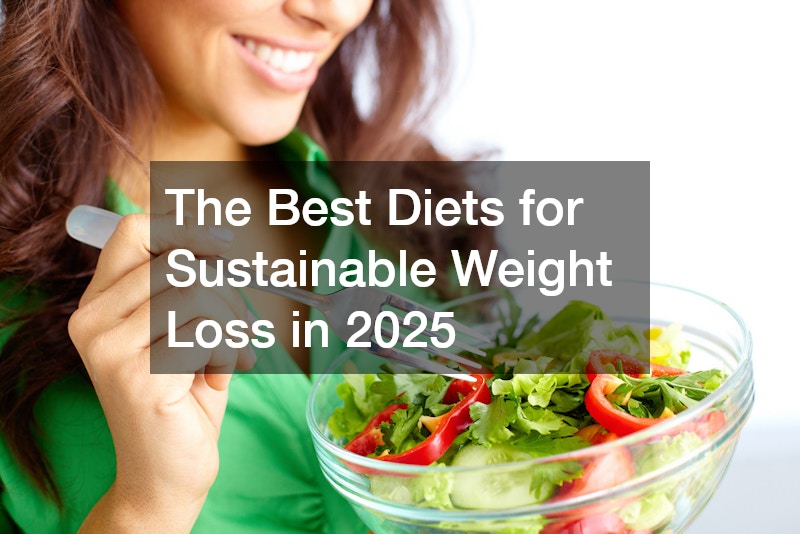Disclaimer: Healthy Lunches. This site provides food and drink content for informational purposes only.
In 2025, individuals seeking sustainable weight loss are bombarded with diet options. Understanding which diets are most effective and sustainable can help create healthier lifestyles. This article explores this topic, addressing popular diet inquiries.
The Essential Components of a Sustainable Diet
Maintaining Nutritional Balance
A sustainable diet maintains a careful balance of carbohydrates, proteins, and fats, ensuring that individuals receive all necessary nutrients. Consuming a variety of foods, such as fruits, vegetables, whole grains, and lean proteins, supports this balance. By focusing on nutritional diversity, individuals can avoid deficiencies and excesses that undermine weight loss goals.
Nutritional balance also entails mindful portion control, which prevents both overconsumption and undernourishment. Customizing portion sizes to individual needs can be guided by dietitians and nutritionists. Strategies like using smaller plates or measuring food portions are practical ways to manage intake effectively.
Furthermore, a balanced diet embeds flexibility, allowing room for occasional indulgences without guilt. This prevents feelings of deprivation that can derail long-term efforts. Ultimately, a sustainable diet fosters a positive relationship with food, promoting enjoyment and health simultaneously.
Incorporating Physical Activity
Physical activity is an integral component of a sustainable weight loss strategy. It boosts metabolism, helps build lean muscle, and improves overall cardiovascular health. By complementing diet with regular exercise, individuals can amplify their weight loss results and maintain these results long-term.
Exercise routines should encompass a mix of aerobic workouts, strength training, and flexibility exercises. Each type of activity offers unique benefits, such as enhanced stamina, increased muscle mass, and improved joint mobility. A well-rounded fitness regimen can be enjoyable and adaptable, preventing monotony and encouraging consistent participation.
For those new to exercise, starting with small, manageable activities is key. Walking, light jogging, or even dancing can be enjoyable entry points. Over time, gradually increasing the intensity and variety of workouts can further motivate individuals and lead to enduring success.
Diets Considered the Most Effective in 2025
The Mediterranean Diet
The Mediterranean Diet has consistently been recognized for its health benefits and sustainability. It emphasizes the consumption of fresh fruits, vegetables, whole grains, and healthy fats such as olive oil. Research shows that this diet not only supports weight loss but also reduces the risk of heart disease and diabetes.
In 2025, the Mediterranean Diet continues to be popular due to its balanced approach and emphasis on moderation. It encourages social eating and a culture of enjoyment around food, contrasting with restrictive diets. The diet’s flexibility and variety help prevent the feelings of deprivation commonly associated with other weight loss attempts.
Besides its physical health benefits, this diet aligns with environmental sustainability by prioritizing locally sourced and seasonal foods. This reduces the carbon footprint, making the Mediterranean Diet a conscious choice for both personal and planetary health. By fostering wholesome eating, this diet encourages longevity and vibrant living.
Plant-Based Diets
Plant-based diets have surged in popularity as effective strategies for sustainable weight loss in 2025. These diets minimize or eliminate animal products, emphasizing whole foods like vegetables, beans, nuts, and seeds. By focusing on plants, individuals consume fewer calories and saturated fats while increasing their intake of fiber and antioxidants.
Studies demonstrate that plant-based diets can lead to sustained weight loss and lower incidences of chronic illnesses. They have been linked with a reduced risk of obesity, heart disease, and certain cancers. The adaptability of plant-based diets allows for personal preferences, making them accessible and practical for diverse lifestyles.
Moreover, choosing a plant-based approach contributes to environmental sustainability by reducing the reliance on resource-intensive livestock farming. As awareness of the environmental and ethical impacts of food choices grows, more individuals adopt plant-based diets. This shift not only nurtures personal health but also supports ecological preservation.
How Can One Identify a Fad Diet in 2025?
Recognizing Unsustainable Claims
Fad diets are prevalent in 2025, often marked by promises of quick and dramatic weight loss. Common red flags include the elimination of entire food groups, strict rigidity, and lack of scientific backing. Such diets may provide rapid results, but they usually compromise nutritional balance and sustainability over time.
Unsustainable claims are frequently advertised by celebrity endorsements and highly marketed supplements or products. Instead of focusing on long-term health, fad diets appeal to the desire for immediate change. Consumers should be wary of these claims and prioritize diets rooted in comprehensive, believable benefits.
Recognizing the signs of a fad diet involves critical examination of the diet’s foundations. Individuals should inquire about the diet’s scientific validity and potential health risks. If promises seem too good to be true, it may be wise to seek professional guidance or consider more established dietary approaches.
The Role of Evidence-Based Research
The importance of relying on evidence-based research in diet selection cannot be overstated. Unlike fad diets, research-supported diets have undergone rigorous testing to validate their health claims. Empirical results offer a robust foundation for making informed dietary choices that support long-term well-being.
Evidence-based diets are typically developed with a holistic approach, considering diverse aspects like culture, lifestyle, and individual health needs. They promote balanced nutrition and adaptable strategies that accommodate personal preferences. This flexibility allows people to sustain dietary changes over the long haul, enhancing the likelihood of success.
Access to accurate, research-backed information empowers individuals to make proactive decisions about their health. Consultations with healthcare professionals, dietitians, and credible sources provide valuable insights into evaluating diet trends. Ultimately, well-researched diets offer more reliable outcomes than transient fads, accentuating the importance of careful consideration.
Sustainable weight loss in 2025 requires choosing diets that balance nutrition, promote regular activity, and are backed by evidence. By understanding the components of effective diets and avoiding fads, individuals can achieve lasting health results. Informed choices ensure the development of a healthy lifestyle that endures beyond immediate weight loss goals.

